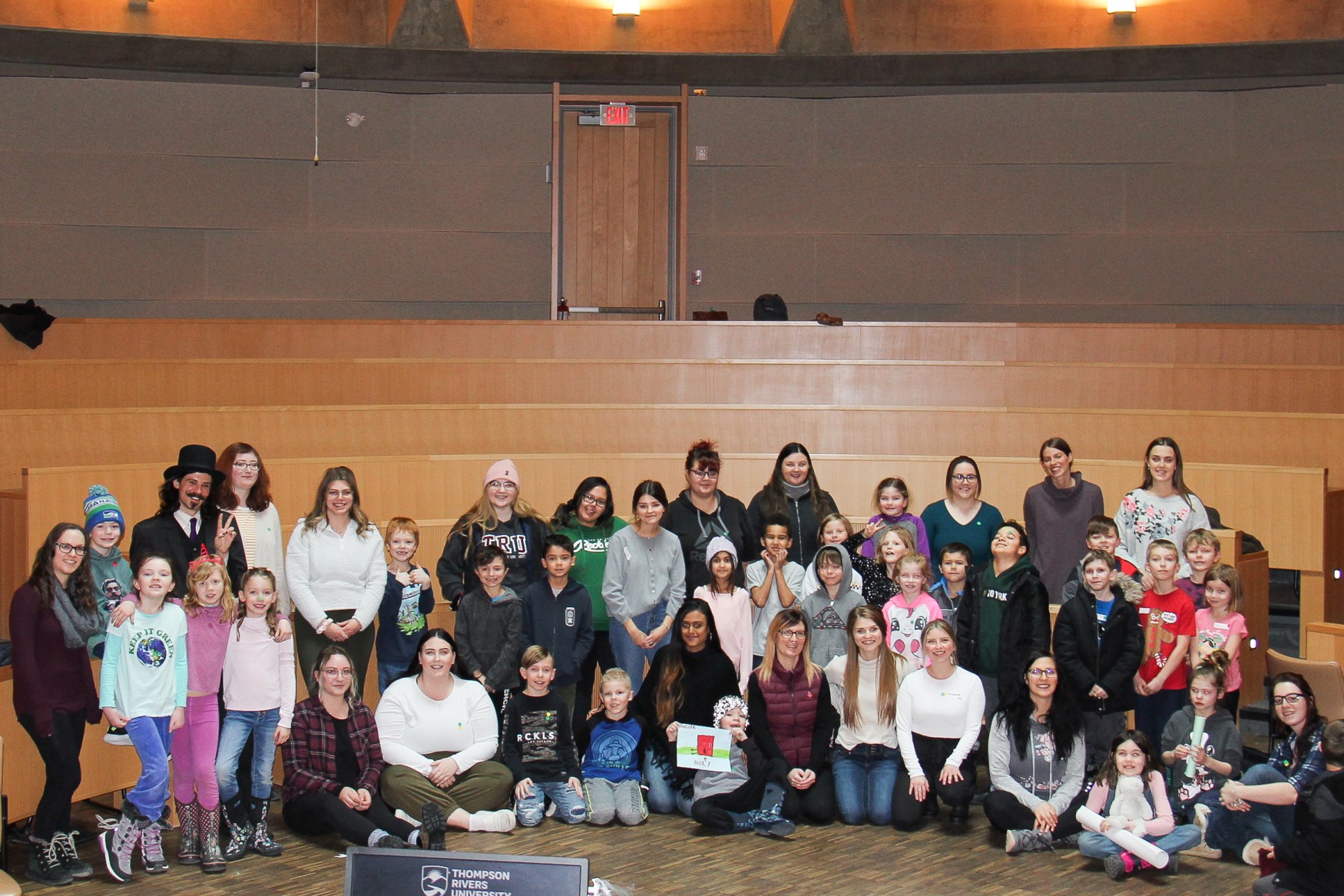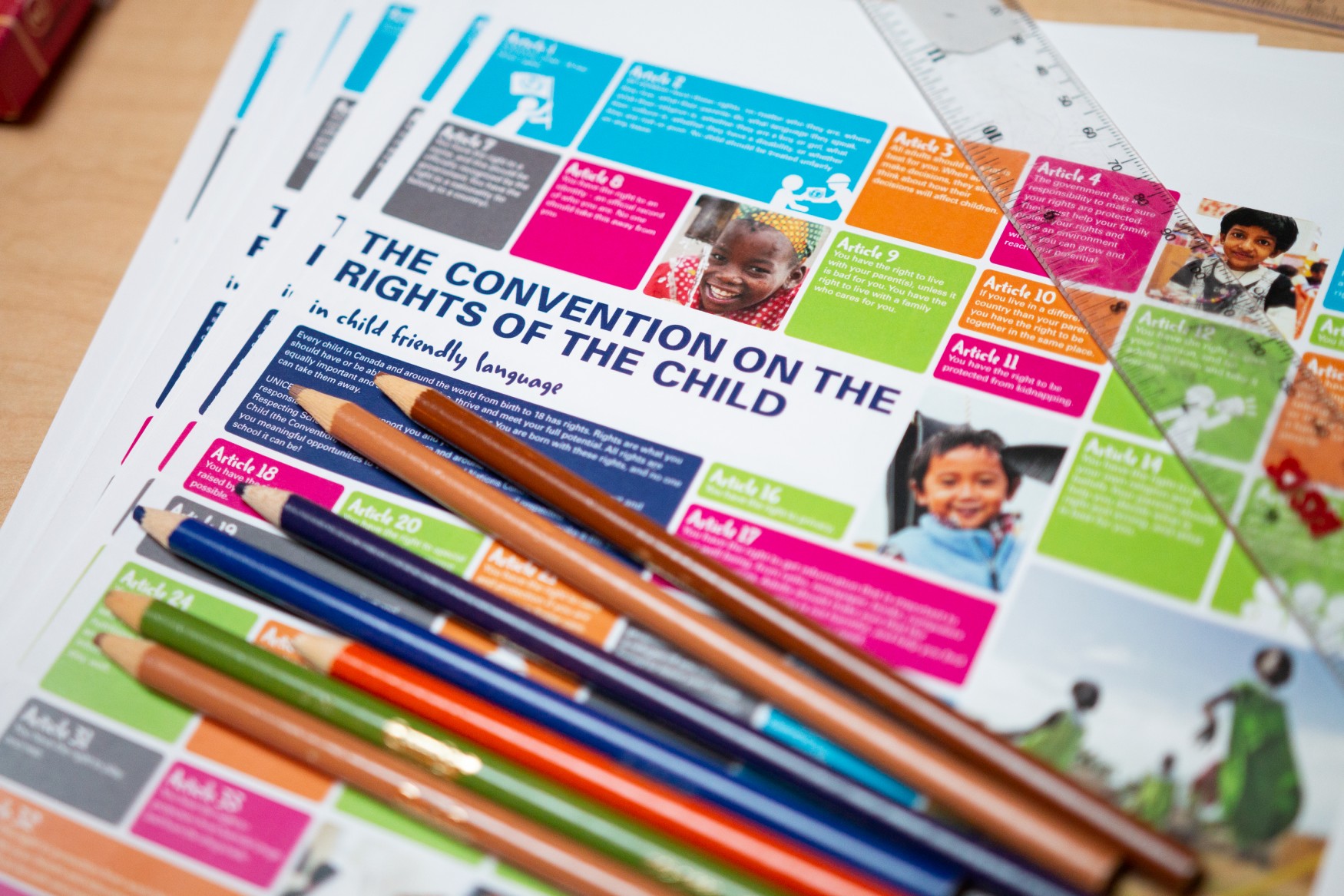Excited, giggling kids marching about, adults scurrying after them, joyful exclamations, and abandoned, half-eaten mandarin oranges filled the ordinarily peaceful, serene space of the round room in the House of Learning.
Forty-one grades 2 and 3 children from School District #73 were positively buzzing and 26 TRU students (and their instructor) were tasked with keeping them entertained and, well, on task. Their mission: teach the youngsters about children’s rights, set out by the United Nations Convention on the Rights of the Child. In other words, they were introducing the group to basic human rights that children worldwide should have.

TRU students and SD 73 students (some children exercised their right to not be photographed).
This Jan. 22, 2020 session was the second meeting of TRU’s Faculty of Education and Social work’s event with SD73, bringing local school children to campus. K-16: Mind the Gap is an initiative that connects TRU faculty and students with school-aged students to extend everyone’s learning while reinforcing community.
Pairs of TRU students enrolled in Introduction to Professional Foundations of Child and Youth Care (CYCA 2000) worked together to prepare, build and deliver learning opportunities in order to; first, get to know the children, and second, to teach them one right of children worldwide. Then, the team was to create an artistic representation of the right assigned to them.
“Even though they only had two visits, it appeared to be a very meaningful time. Some children were really emotional about having to leave and said, ‘see you in nine years!’”, said social work and human service faculty member and project developer Tanya Pawliuk. “We talk a lot about the importance of relationship building, and Mind the Gap is meant to bring community and campus together.”
Meghan Selski is a year into a human service diploma and would one day like to become a social worker in a hospital setting. She and fellow first-year Teira Joseph teamed up for this challenge, and both came away learning as much from the children as they taught.
Selski discovered the importance of flexibility and going with the flow when dealing with little humans.
“Teira and I spent hours creating a lesson plan and we ended up having to scrap most of it because the kids were not into it. I think the kids enjoyed that we were able to adapt and create a new lesson plan on the fly that catered more to how they wanted to learn,” she said.
Explaining the concept of universal human rights, and teaching one is no small task.
Some rights are straightforward:
Article 6: You have the right to an identity–an official record of who you are. No one should take this away from you.
Article 24: You have the right to the best health care possible, safe water to drink, nutritious food, a clean and safe environment, and information to help you stay well.
Others, more complex:
Article 14: You have the right to choose your own religion and beliefs. Your parents should help you decide what is right and wrong, and what is best for you.
Article 29: Your education should help you use and develop your talents and abilities. It should also help you learn to live peacefully, protect the environment and respect other people.
The teams reinforced the learning with artful representations created using colourful paper, felt markers and other vibrant supplies.
Growing up with foster children sparked Joseph’s interest in social work early on, and she felt that a diploma in human service was a great first step on her path to a bachelor of social work.
“When we learned about the Mind the Gap project, I was a bit hesitant. But once we met with the kids it was a really great learning experience. Kids are so interesting (in a good way!) so working with them was a lot of fun,” Joseph said.
“The most challenging part was keeping all of them on track and engaged in the same activity, while being very flexible. Each kid is different and what works for one kid won’t work for another.”
TRU students took away as much as they helped impart on the schoolchildren, and the littles left with a greater understanding of their own rights, and what was clearly a very fun experience on campus.
The bus pulled away. The orange peels were tossed in the compost, the juice boxes recycled and the round room was quiet once again. But, the partnership with K-16: Mind the Gap will continue bridging campus and community, and hopefully, it will always bring as much laughter and learning as this session did.
Learn more about education and social work at TRU
More information on K-16: Mind the Gap
More information on the United Nations Convention on the Rights of the Child


